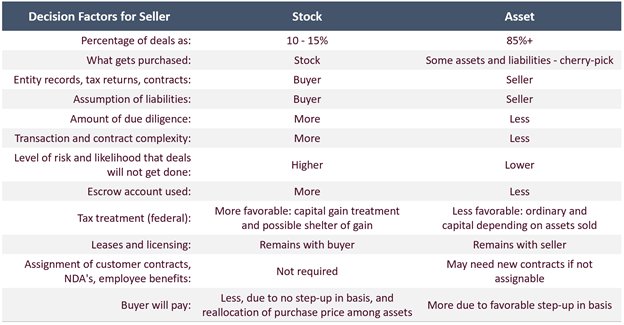If you are at all contemplating a sale in the next 5 years, you are probably also contemplating whether you should sell the stock or the assets of your company. Unfortunately, many times you don’t have the option of one over the other, as the buyer usually makes that determination. That said, you can potentially ask for an increase in the purchase price if its an asset sale vs a stock one to help compensate for the additional taxes you will likely incur. I will talk about that more later.
There is a lot of ground to cover on the topic of asset vs stock, and we will cover it all at a high level in this post.
Next week, however, I will get more into the nuances of a stock transaction that works as an asset transaction for the buyer. This is referred to as an F reorganization after the IRS Code Section 368(a)(1)(F) – again, more on that next week.
What is an asset sale?
An asset acquisition is when the buyer only purchases the assets (not the stock) of your company. Those assets are typically your customer list, your employees, inventory and furniture and fixtures, and any intellectual property (IP) you might have.
The seller can decide not to sell all assets. For example, maybe you have created IP that you don’t’ think you will get the value out of by selling to the buyer, in which case you will want to carve out that IP and not have it part of the transactions.
When I sold my second company (a ERP/CRM value added reseller) I did an asset sale. I kept many things, like my website URL, my phone number, my cars, my art. This works well for those of you who own the office space you are in, and that real estate is held in the company. Because I was not selling the company, I also kept my benefits plan and my payroll provider numbers. This was important for me to maintain all my benefit plans for the employees that remained with me and didn’t move to the new company as part of the transaction. **
Below are some other aspects of an asset sale:
- The buyer only acquires the assets and liabilities it identifies and agrees to acquire and assume, subject to any liabilities imposed on the buyer as a matter of law or condition.
- The ability to pick and choose specific assets and liabilities provides the buyer with flexibility. If you have deferred revenue, this will also be included in the sale.
- The seller remains as the legal owner of the entity.
- The due diligence is usually easier, as the buyer is not picking up all the liabilities of the company. For example, you retain the liability on any sales tax or nexus resulting in unpaid taxes.
- The seller pays off all short-term debt. They may retain long-term debt obligations or may be required to pay them off (i.e., long-term asset lease on equipment, etc.).
- You will need to terminate your employees and have the buyer produce new offer letters. You will also need to terminate all benefits currently offered. This is typically not a problem if the buyer has like-kind benefits.
- The taxation on the transaction is likely to be a combination of ordinary and capital gains based upon the structure of the company. If you are a C corporation, this could be a double taxation event. ***
I find most strategic buyers like to structure transactions as asset purchases so they can receive a step up in basis, which allows for greater depreciation of the assets they have purchased. But that may not be most advantageous for a seller.
What is a stock sale?
A stock sale results in a transfer of the ownership of the business entity itself, but the entity continues to own the same assets and have the same liabilities. So, you are selling all of your common shares of stock in the company. Everyone is selling their stock, not just the majority shareholders. A stock purchase is simpler in concept than an asset purchase because you don’t have to redo contracts and agreements (with some exceptions), and you can keep all the payroll and employee benefits in place. This also means you don’t have to terminate your employees and give them a new offer letter, which many times causes angst and renegotiation of salaries.
The following are several advantages of a stock transaction:
- The buyer doesn’t have to bother with costly re-valuations and retitles of individual assets.
- Buyers can typically assume non-assignable licenses and permits without having to obtain specific consent.
- Buyers may also be able to avoid paying transfer taxes.
- Buyers don’t have to redo payroll taxes, medical and other benefits associated with the old FEIN
- The transaction is taxed at the lower capital gain rate – with exceptions.
My last company that I sold to a PE firm was a stock sale. Given my company was a C Corporation, this was the best option for me; otherwise, I would have had double taxation on the transaction (once at the corporation level and again at the individual level via either dividend, salary, bonus, etc.).
The more complex the contracts with customer and suppliers, the more likely the buyer will opt for a stock transaction over an asset one.
The biggest disadvantage for the seller is that it requires an extra level of scrutiny via due-diligence. Never fun, but since the buyer is acquiring everything, they need to be extra cautious. This due-diligence process can extend the sale process if you are not prepared in advance.
For the buyer, the main disadvantage is they receive neither the “step-up” tax benefit nor the advantage of handpicking assets and liabilities. Therefore, I rarely see stock deals with strategic buyers, but it is a tool for PE as they then use the F reorganization plan to achieve their goals.
I go into much more detail on the advantages and disadvantages of a stock vs asset transaction in my course, Ready…Set…SELL, as well as understanding the in-depth components of an F reorganization. To learn more or get on my waiting list, please visit our course page.
Below is a chart from my book, Get Acquired for Millions, summarizing the decision factors for both types of transactions.

Special tax treatment for C Corporations
Finally, I wanted to share a little tax tip with those of you who are C-Corporations.** Per the 2021 Instructions to Form D (where you would report a stock sale of your company) there is still an exclusion for C Corporations where you could exclude anywhere between 50% – 100% of the capital gain on the sale of your stock if you held it for more than 5 years. That’s probably another post in itself, but be sure to look up the rules on Form D under “Exclusion of Gain on Qualified Small Business (QSB) Stock Section 1202. Here is a link to that form.
Be sure to read the next post on when a Stock Sale can look like an Asset sale for a buyer. While this is more of a legal concept, I think it is important to understand how this works and to ask for it if it makes sense in your transaction.
I know this was a pretty heavy post, so thanks for taking the time to read through it all.
* Source: Asset Purchase vs Stock Purchase (wallstreetmojo.com)
** Even if all the employees are moving over to the new company as part of the transaction this does allow you to continue to fund your current retirement plan which may allow you to shelter some of the proceeds while you wait to become eligible for a new plan, assuming the buyer has one.
*** I am not providing tax information, so please check and validate with your own tax advisor.


 Cleaning up the Balance Sheet in Preparation for a Sale
Cleaning up the Balance Sheet in Preparation for a Sale